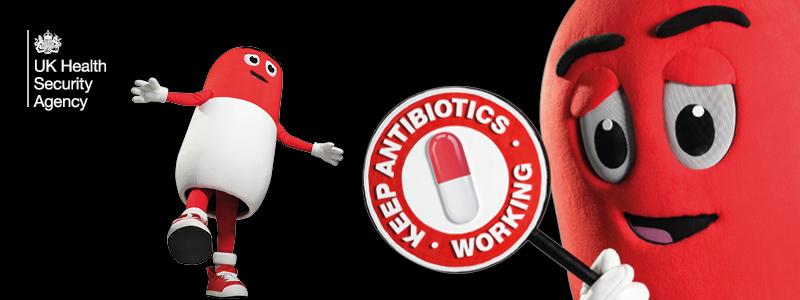The UK Health Security Agency (UKHSA) has launched a digital campaign to help keep antibiotics effective and reduce the threat of antibiotic resistance. The campaign introduces a new mascot, Andi Biotic, who is on a ‘one-pill’ mission to help young adults understand the correct use of antibiotics.
Public concern but limited understanding
New research from UKHSA shows that 42% of people in the UK worry about how antibiotic resistance affects them. Yet 54% either don’t know how to help (28%) or wrongly believe they can’t do anything (26%).

The campaign targets adults aged 18 to 34. It builds on the 2018 Keep Antibiotics Working campaign, using humour and digital content to connect with a younger audience. This initial pilot will test how well the message lands through online channels.
Andi Biotic explains how to take antibiotics
Over six weeks, Andi Biotic will offer advice through digital platforms. The campaign addresses common misconceptions, such as the belief that antibiotics work for colds and flu. It encourages people to:
- Only take antibiotics when a healthcare professional prescribes them
- Follow the instructions exactly
- Avoid saving antibiotics for later use
These actions help protect antibiotics for everyone, now and in the future.
Young adults more likely to misuse antibiotics
Survey findings show that 45% of young adults took antibiotics in the past year. That compares to 33% of the general population. Among young adults, 41% reported getting antibiotics in the wrong way—such as buying them from non-pharmacy shops, using someone else’s medication, ordering online, or sourcing them abroad without a prescription. Only 23% of the general population reported the same.
UKHSA will promote the campaign across social media, as well as in GP surgeries and pharmacies throughout April and May.
Experts call for action
Professor Dame Jenny Harries, Chief Executive of UKHSA, said:
“Antibiotic resistance affects people in the UK every day. It’s one of the biggest threats to our health. But we can all help. Everyone, especially young people, can take simple steps—use antibiotics only when prescribed and always follow medical advice. This helps protect not just ourselves, but our communities and future generations.”
A patient’s story
A young adult with recurring urinary tract infections (UTIs) shared their experience:
“The UTI trapped me in a cycle of infections that resisted one antibiotic after another. It wrecked my bladder and my confidence. I lost the ability to enjoy dancing and intimacy. I now follow a strict daily routine to manage it—drinking litres of water and taking supplements after intimacy. I didn’t even know what antibiotic resistance was before this. I live in hope that something will work again one day so I can live freely.”
NHS and government back campaign
Ashley Dalton, Minister for Public Health and Prevention, said:
“Antimicrobial resistance is a serious threat. We need to act. When people know when and how to take antibiotics, they help protect them for the future. Our National Action Plan shows we are committed to tackling this now.”
Professor Sir Stephen Powis, National Medical Director for NHS England, added:
“Antimicrobial resistance already affects tens of thousands of people in the UK each year. It makes routine treatments harder and riskier. If we lose effective antibiotics, even common procedures like C-sections and cancer treatments could become dangerous. Young people need to understand how vital their role is in preventing superbugs.”
Responsible use protects lives
Antibiotic resistance makes infections harder to treat. It can lead to complications such as sepsis, bloodstream infections, hospitalisation, and even death. People with resistant infections face higher risks than those with infections that respond to antibiotics.
Resistance happens naturally, but misuse of antibiotics speeds it up. Taking antibiotics too often, for the wrong reasons, or not finishing a course all contribute to the problem.